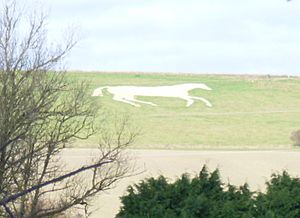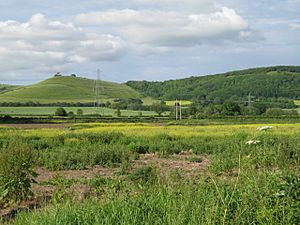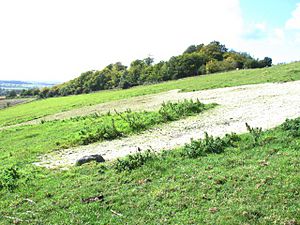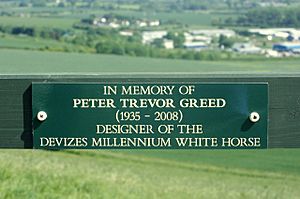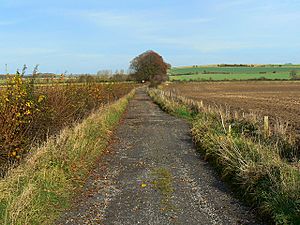Devizes White Horse facts for kids
The Devizes White Horse, also known as the Devizes Millennium White Horse, is a giant horse shape carved into a hillside. It's located on Bank Field, a steep slope at Roundway Hill, just outside the town of Devizes in Wiltshire, England. This amazing chalk figure was created in 1999 to celebrate the upcoming year 2000.
The design of this horse was inspired by an older white horse figure. That one was also on Roundway Hill and was known as the "Snobs Horse." You can sometimes still see faint outlines of the old Snobs Horse if the conditions are just right.
The Devizes White Horse is the eighth and newest large white horse figure in Wiltshire. It is 45.7 metres (150 ft) long and 45 metres (148 ft) high. Even though it's sometimes seen from an angle on nearby roads, you can spot this horse from many miles away. It's even visible from Bratton Castle and the Vale of Pewsey. From the Vale of Pewsey, you can see the Devizes White Horse and the Alton Barnes White Horse facing each other.
Contents
The Story of the White Horses
The Original Devizes White Horse (The Snobs Horse)
Back in 1845, local shoemakers carved a white horse into the west side of Roundway Hill. This spot was perfect because it was high up, about 600 feet above sea level. This meant the horse could be seen from far away. People in the area called it the "Snobs Horse." "Snobs" was a local word for shoemakers.
At that time, there were already several other white horse figures in Wiltshire. These included horses at Westbury, Alton Barnes, Hackpen, Cherhill, and Marlborough. Sadly, the Devizes horse was not looked after and disappeared around 1922. We don't know its exact size.
In 1954, a student named James Smith saw a faint outline of a horse while cycling. It was the old Snobs Horse! A sketch was made of its design. This sketch was later used for the new Millennium White Horse, but the new horse faces the opposite way. People tried to bring the Snobs Horse back in 1909, 1939, 1977, 1987, and 1998, but none of these attempts worked.
The Snobs Horse was made by digging a trench and filling it with chalk. This method is called "trenching." Because of this, parts of the horse sometimes reappear, even after many years. This happened in 1979, 1998, 2000, and 2005. Each time it appeared, it seemed to be about half the size of the new Millennium White Horse.
The Devizes Millennium White Horse
In 1998, a new resident of Devizes, Sarah Padwick, suggested creating a new white horse on Roundway Hill. She wanted to celebrate the upcoming millennium. The local newspaper liked her idea, and plans began.
At first, they wanted to recut the old Snobs Horse in its original spot. However, that area was a special protected site, so they couldn't. Luckily, a local farmer, Chris Combe, offered a different part of his land on Roundway Hill. The Wiltshire County Council and Roundway Parish Council supported the project. The design for the new horse was based on James Smith's 1954 sketch, but it was flipped to face right. This new horse also looks like it's moving, unlike most other Wiltshire white horses, which stand still.
A group called the 'Cavaliers of the Devizes Millennium White Horse' was formed to manage the project. They also planned for the horse's future care. Many people from the local community helped. About 200 volunteers dug the outline of the horse by hand. Then, Pearce Civil Engineering used machinery to dig out the rest of the horse's body. They also placed the rocks for the horse's eye and nostril. The Devizes White Horse was finished on September 29, 1999.
Keeping the Horse Clean
The Devizes White Horse needs regular care to stay bright and white. Weeds and grass can grow on it, making it look dull. In April 2007, the first big clean-up, called "scouring," happened. Volunteers helped remove weeds and moss.
By September 2008, the horse was hard to see again. The Devizes Millennium White Horse Committee looked for money to clean it. The Probation Service Community Service Group then took over the cleaning. They have been regularly cleaning the horse ever since.
Modern Times and Celebrations
Locals sometimes call the Devizes White Horse "Chalkie." In 2000, a 90-mile walking path called the 'Wiltshire's White Horse Trail' was created. It visits all eight of Wiltshire's white horses, including the Devizes one. Since 2006, the Devizes White Horse has been the starting point for the 'White Horse Challenge.' This yearly charity event involves walking all 52 miles around the eight white horses to raise money for Wiltshire Air Ambulance.
The horse is even part of the logo for Roundway Parish Council. Peter Greed, who designed the Millennium Horse, passed away in 2008. A plaque on the entrance gate to Bank Field remembers him.
Special Events
To celebrate the millennium, a time capsule was buried under the horse on December 31, 1999. The horse was also lit up with bright lights that night, from dusk until the morning of January 1, 2000. The lights could be seen from miles away! The horse was lit up again on June 30, 2012, as part of an arts festival. Over 300 lanterns were placed around the horse, lighting it from 10 PM to midnight.
On October 10, 2009, for the horse's tenth anniversary, locals and the Mayor of Devizes walked onto the horse. They formed a giant human number "10." A small plane flew over to take a picture from above. In autumn 2012, for its 13th birthday, local residents held a picnic on the hill. Children brought flowers to make a garland for the horse's neck. In 2017, a scout group helped clean and weed the horse for St. George's Day.
A Smaller Copy
To celebrate its 10th anniversary in 2012, Nursteed School in Devizes built a small copy of the Millennium Horse on its school grounds. This replica is one-tenth the size of the original. Students and staff worked for months to build it. They even placed a small number "10" on it, just like the human "10" figure formed on the real horse in 2009.
 | Misty Copeland |
 | Raven Wilkinson |
 | Debra Austin |
 | Aesha Ash |


